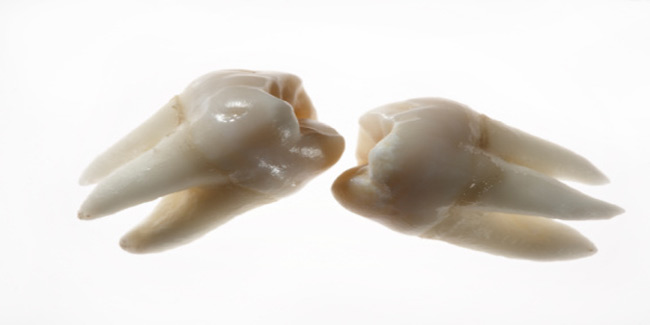
A tooth is considered to be impacted if it fails to emerge completely though the gums.
An impacted tooth is a tooth that fails to fully pass through the gums. It is usually positioned against another tooth, bone, or soft tissue so that it makes it difficult to fully erupt through the gums to reach its normal position in the mouth. The most common teeth to become impacted are the wisdom teeth.
An impacted tooth can trap food, plaque, and other debris leading to inflammation and tenderness of the gums and unpleasant mouth odor. Bad breath, pain or tenderness of the gums, prolonged headache or jaw ache, redness and swelling of the gums around a tooth, unpleasant taste when biting down are some of the common symptoms of an impacted tooth. The prognosis of the impacted tooth can help avoid several problems.
The impaction is most common in the third molars, also called wisdom teeth. Wisdom teeth are most vulnerable to impaction because they are the last teeth to erupt. By the age when the wisdom teeth erupt the jaw has stopped growing and may be too small to accommodate wisdom teeth. An impacted tooth remains embedded in soft gum tissue or bone beyond its normal eruption time. The impaction may also result in neighboring teeth getting twisted, tilted, or displaced.
Impacted wisdom teeth are very common and are often painless. However some professionals believe that an impacted tooth can affect all the teeth. An impacted tooth pushes on the next tooth, which in turn pushes the next tooth, eventually misaligning all other teeth.
Table of Content:-
Prognosis
Impacted teeth may cause no problems for some people and may never require treatment. However prognosis can be very helpful in determining the treatment required for the impacted tooth. Treatment is usually successful when it does cause symptoms. It is recommendable to have wisdom teeth removed before age 30. The bones are still flexible allowing easier removal of the impacted tooth and better healing.

With age the bone becomes more rigid and complications can develop. The possible complications of an impacted tooth include abscess of the tooth or gums, chronic discomfort in the mouth, infection, malocclusion of the teeth, plaque trapped between teeth and gums.
Usually no treatment is needed for the impacted tooth. Over-the-counter pain relievers, warm salt water or over-the-counter mouthwashes can help if the impacted tooth causes discomfort. Removal of the impacted tooth is the usual treatment and may require require an oral surgeon in difficult cases.
How we keep this article up to date:
We work with experts and keep a close eye on the latest in health and wellness. Whenever there is a new research or helpful information, we update our articles with accurate and useful advice.
Current Version